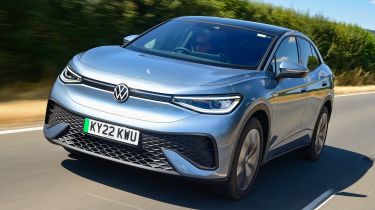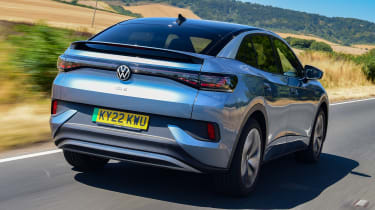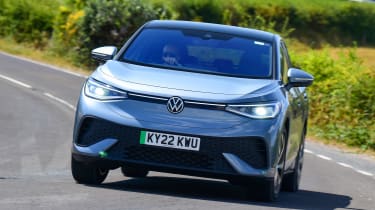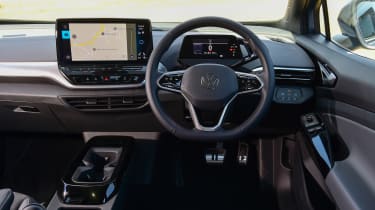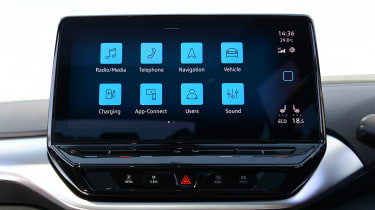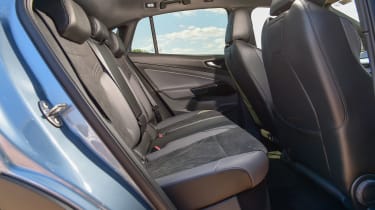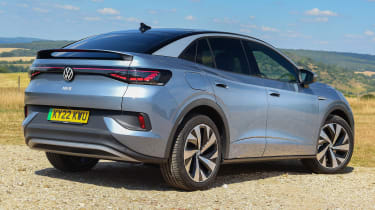Volkswagen ID.5 review
Despite its merits, Volkswagen’s trendy electric coupe-SUV is its weakest EV yet

The Volkswagen ID.5 attempts to put a stylish spin on humble underpinnings, however its coupe-esque roofline writes cheques that the rest of the car simply cannot cash. The driving dynamics and performance in particular fail to meet expectations or match its many, equally rakish coupe-SUV rivals. The same goes for the so-so interior quality and frustrating cabin ergonomics.
There are definitely strong points; it’s very comfortable and spacious, plus we’ve seen it achieve decent efficiency first hand. But in our opinion, those few merits aren’t enough to justify the ID.5’s price tag, especially with more esteemed alternatives costing similar money.
About the Volkswagen ID.5
Whenever a new mid-size or large SUV comes on the market, it now seems inevitable that its makers will introduce a coupe-esque version shortly after. In Volkswagen’s case, it took the rather conventional ID.4 electric family SUV as the base for creating the more style-focused ID.5.
The VW ID.5 is one of the four members of VW’s ID family electric cars which currently includes the ID.3 hatchback, the aforementioned ID.4 and the ID. Buzz minibus. More are on the way though, namely the ID.7 saloon that’ll rival the Tesla Model 3 and the £22k ID.2 supermini, based on the charming ID.2all concept.
The ID.5 is based on the Volkswagen Group’s MEB platform, designed exclusively for use by electric cars, that also serves as the underpinnings for the Cupra Born, Audi Q4 e-tron and Skoda Enyaq iV. The Audi and Skoda also have rakish counterparts called the Q4 Sportback e-tron and the Enyaq Coupe iV respectively, which are very similar in concept and capability to the ID.5.
Used - available now
Of course, there are plenty of similarly sleek electric SUVs out there that will be gunning for the same business as the ID.5 – our 2022 Car of the Year, the Nissan Ariya, among them. Other rivals include the Volvo C40 Recharge, Genesis GV60 and Kia EV6. The Ford Mustang Mach-E and Tesla Model Y also swap the conventional boxy SUV shape for a more flowing silhouette, and, like all the cars we mentioned, in a comparable spec have similar price tags to the ID.5.
Speaking of which, the ID.5 starts from nearly £51,000 at the time of writing. Buyers get a choice of three powertrains called Pro, Pro Performance and GTX, plus two trim levels: Style and Tech. The Max specification offered at launch is currently off the price list, while the high-performance GTX only comes in Style trim for now.
Electric motor, drive and performance
When we pitted the Volkswagen ID.5 against the Genesis GV60 and Nissan Ariya, even though our test car rode on optional 20-inch wheels, the VW had the best ride of the bunch. It’s not as soft and bouncy as the GV60, but it’s better at absorbing bumps – especially at low speeds. However, you can hear the suspension working, because the sound insulation isn’t quite as impressive as in the Nissan or Genesis.
The ID.5 is impressively stable and relaxing at a motorway cruise, though, and that slippery shape keeps wind noise to a minimum. Around town, the tight turning circle and light steering make it a doddle to drive. However, beside the Nissan and Genesis, it all feels a little uninspiring.
There’s decent traction – if a little less than in the Nissan – but the ID.5 feels lazy when turning into corners. The steering is accurate enough, but merely gets the job done rather than providing the driver with the impression of connection to the car. In isolation it’s okay, but it’s against the likes of the Ariya and GV60 that are quite enjoyable to drive, yet similarly refined.
Based on our time in the three cars, it’s the Nissan Ariya that provides the most impressive balance between ride and handling. And for those after a properly engaging family EV to drive, we’d recommend the Ford Mustang Mach-E over the ID.5 any day of the week, while a Kia EV6 is generally faster and more polished in its responses.
0-62mph acceleration and top speed
The base ID.5 uses what VW calls the ‘Pro’ powertrain. It consists of a single electric motor for driving the rear wheels, producing 172bhp and 310Nm of torque. It’s significantly less powerful than the single-motor Ariya or GV60 we tested it against, and as a result the more than two-tonnne coupe will crack the 0-62mph benchmark in a lacklustre 10.2 seconds.
This version of the ID.5 feels a little sluggish to move off – you don’t get the kick that many EV converts will have grown to enjoy and expect. There isn’t even a sport mode to perk up the throttle response in base cars like ours.
The Pro Performance set-up also uses a single motor, but bumps the power output up to 201bhp and cuts the ID.5’s 0-62mph time down to 8.4 seconds. While it still can’t match a Tesla Model Y for straight-line speed, the Pro Performance feels fairly brisk during initial acceleration, gathering speed nicely thereafter.
The ID.5 GTX features an additional e-motor on the front axle for all-wheel drive, and a combined 295bhp and 460Nm of torque. The 0-62mph sprint in the ID.5 GTX takes 6.3 seconds, plus the top speed jumps from 99mph to 113mph. When we tested the ID.5 GTX in 2022, we found the instantaneous torque delivery from the two electric motors allowed the 2.2-tonne performance EV to feel quite brisk initially, before a very linear feeling of acceleration takes over.
Range, charging and running costs
Thanks to its sleek aerodynamic shape and 77kWh battery that’s fitted to all models, the ID.5 offers a range of up to 327 miles, while the more potent ID.5 GTX with its dual-motor set-up can cover 314 miles on a single charge. Both figures are about what you’d expect for this class of EV, as the Kia EV6, Genesis GV60 and Nissan Ariya can all crack the 320-mile mark.
However, while a big battery gives you a good starting point for a long range, efficiency is what matters more for keeping the costs down and more miles between top-ups. When we tested the ID.5 against the GV60 and Ariya, it achieved an impressive 3.9 miles per kilowatt-hour, compared to the Nissan’s 3.7mi/kWh and the 4.0mi/kWh we saw from the Genesis. The ID.5’s performance translates to a real-world range of 300 miles.
Big batteries also result in longer charging times though, and a regular 7.4kW home wallbox will take over 12 hours to fully recharge the ID.5’s 77kWh battery back. The ID.5 lags behind its rivals from Kia, Genesis and Tesla when it comes to rapid charging; at best it can reach a relatively average 135kW, allowing for a 10 to 80 per cent top-up in 29 minutes.
As with all electric cars, the ID.5 is exempt from road tax (VED) and the London Congestion Charge until 2025, and it currently attracts a mere 2 per cent Benefit-in-Kind (BiK) company car tax rate.
Insurance groups
Depending on which trim and powertrain you pick, the Volkswagen ID.5 attracts an insurance rating between group 27 and 39 (out of 50). That’s on par with the Ford Mustang Mach-E’s groups 33 to 40 ratings and the Audi Q4 e-tron Sportback in groups 31 to 40, but the ID.5 will be cheaper to insure than a Tesla Model Y which lands in groups 46 to 49.
Depreciation
According to our latest data, you can expect the ID.5 to retain between 53 and 55 per cent of its original value after three years of ownership. Those are OK figures, but its more conventional SUV sister car the VW ID.4 can hold onto as much as 63 per cent of its value over the same period.
To get an accurate valuation on a specific model check out our free car valuation tool...
Interior, design and technology
Approach the ID.5 from the front and you might get a little déjà vu, because it’s nearly identical to the VW ID.4 SUV. The changes come at the back, where the 5’s roofline swoops downwards to create a coupe-like profile. While some might question whether such a sporty shape is needed on a practical family EV, there is a tangible benefit to aerodynamic efficiency; at 0.26Cd, it beats not only the ID.4’s 0.28 figure, but also a GV60’s 0.28Cd and the Nissan Ariya’s 0.29Cd.
Step inside and the VW has a clean, minimalist look. The ‘play’ and ‘pause’ logos on the pedals look funky, while the simple rotary gear selector located high up beside the steering wheel is another smart touch. However, other items, such as the dual-function window switches (one pair controls the front and back windows) show that in some places, aesthetics have come at the expense of logical design.
Material quality isn’t up to scratch, either. The feel is largely similar to that of the latest Mk8 Volkswagen Golf; in a hatchback that starts from 25 grand, we don’t think it’s as solid as VWs of old – and on an ID.5 that costs nearly twice as much, it’s even more of an issue.
There are currently just two trims to choose from, and the Style that we’ve spent most time driving is our pick, because it’s the most affordable, yet it has most of the kit you really need: 19-inch alloy wheels, matrix LED headlights, three-zone climate control, a 12-inch touchscreen, reversing camera, panoramic sunroof and all-round parking sensors as standard. For now, the ID.5 GTX is available exclusively in Style specification, but does get larger 20-inch rims at least.
Tech trim adds electrically adjustable front seats, a 360-degree parking camera, a powered tailgate and an augmented-reality head-up display. Range-topping Max trim isn’t available at the moment, but used examples will feature 20-inch wheels, sports front seats, a standard heat pump (optional on the other trims), plus a set of adaptive dampers.
Sat-nav, stereo and infotainment
The ID.5’s in-car tech is shared with the ID.4. As a result, it shares its strengths, and its weaknesses, too. We found the 12-inch touchscreen was sharp, responsive and the colours are bright without being fussy. Loading speeds are a big plus and plotting a route is extremely rapid. It’s just a shame some of the minor details of functionality seem to have been overlooked.
The digital instrument panel meanwhile, which moves with the steering wheel so it’s always within view of the driver, is a neat idea and doesn’t overload you with graphics or data, you just get the essentials.
However, the ID.5’s technology and controls feature oversights, shared among the entire VW ID family, that continue to frustrate us. Chief among those are the climate and volume controls; they’re placed on a touch-sensitive slider below the screen, at the exact point where you might choose to steady your hand. They’re not backlit, either, so adding extra warmth at night is an irritating game of pot luck.
Practicality, comfort and boot space
While the interior quality might not be up to scratch, the ID.5 is at least spacious, with the standard-fit panoramic sunroof lending a light and airy feel to the cabin. The low central storage bin and flat floor in the front and rear also help with this. Storage space is generally good, with the bottoms of the large door bins carpeted to stop items rattling about, which is a nice touch.
Size
The ID.5 measures 4,599mm long with a 2,771mm wheelbase. It also stands 1,615mm tall and 1,852mm wide (excluding the side mirrors). Curiously, the ID.5 GTX is ever so slightly shorter, measuring 4,582mm from nose to tail, but its dimensions remain the same. Either way, the ID.5 is about the same size as the Nissan Ariya, just not as tall.
Leg room, head room and passenger space
There’s plenty of space inside the ID.5. Despite the car’s sloping ceiling and panoramic sunroof, rear headroom is good. In fact, there’s more on offer in the ID.5 here than in a Mustang Mach-E, so even taller adults can sit in the back comfortably.
Plus, being built on an EV-specific platform, the ID.5 benefits from a long wheelbase and completely flat floor, so legroom is generous, too. One small touch we liked was the plastic covers for the Isofix points which made them easy to access, and there’s extra provision for a child seat to go up front.
Boot
The 549-litre boot is substantially larger than that in the Nissan Ariya or Kia EV6; in fact, the ID.5 offers 117 litres more space than the Genesis GV60. Only if you intend to cram items right to the roof will you find any compromise compared to the 5’s ID.4 sibling. The load area is very deep so it’s good for carrying bulky items, but of course you’ve got to hoist heavier stuff over the high bumper line on this SUV, which can be a pain. When the rear seats are folded, space grows to 1,561 litres, which is only a few litres more than the Genesis GV60.
Reliability and Safety
The ID.5 received the maximum five-star crash safety rating from industry body Euro NCAP in 2021, including a 93 per cent score in the adult occupant protection category and 89 per cent for child occupant protection. Standard safety kit on the ID.5 is comprehensive and includes Volkswagen’s ‘Front Assist’ active emergency braking, lane-keeping assistance, adaptive cruise control, traffic-sign recognition, fatigue detection and swerving support in emergencies, plus front and rear parking sensors, a reversing camera and matrix LED headlights.
VW’s electric coupe-SUV hasn’t been around long enough for us to make any kind of definitive statement about reliability or for it to feature in our annual Driver Power owner satisfaction survey. Unfortunately, the same goes for the rest of the VW ID family of EVs. However, the brand itself finished 18th out of 29 on our best car manufacturers rankings, so clearly not every VW owner’s experience was positive.
Warranty
Volkswagen offers a relatively average three-year/60,000-mile warranty on all its cars, which pales in comparison to Hyundai and Kia’s five- and seven-year respective warranties. Meanwhile, the batteries in Volkswagen’s electric cars are covered for eight years or 100,000 miles.
Servicing
You might be used to sending your combustion-engined car for a service every year, but the ID.5 only needs to be looked at every two years. Volkswagen offers a service plan for its ID electric cars which includes one inspection service, one MOT, one brake fluid change and a pollen filter change. It costs either £360 upfront or £30 over 12 monthly instalments.

